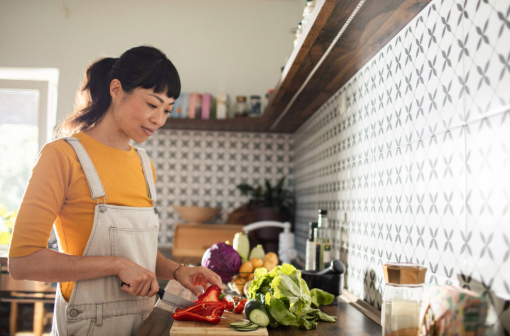“If we look at the reasons people move into a retirement community, security and safety are in the top three, every time.” – Brett Lafranchi.
In the 1997 Australian film The Castle, fair dinkum Aussie battler Darryl Kerrigan said, “A man’s home is his castle”. He was paraphrasing English politician Sir Edward Coke, who expressed a similar idea back in the early 17th century. That was a long time ago, but the sentiment still rings true today – for both men and women.
But in the absence of moats and drawbridges, what makes our “castles” feel safe and secure – especially for the two million Australians who live alone, many of whom are elderly? The answer is found in the principles of psychological wellbeing, community engagement, connectedness with our environment and practical commonsense strategies to feel safe.

Caring for your psychological wellbeing
Some people love living by themselves and can embrace solitude; others feel lonely and bereft without people. Ros Knight, President of the Australian Psychological Society, points out that “Some people have legitimate reasons to feel insecure about living alone, especially if they’ve experienced trauma or domestic violence”.
Ros says a lot of recent research shows that loneliness is a big issue in today’s modern society: "Loneliness is linked with a range of physical illnesses, including heart disease and diabetes. The health effects of loneliness are very real.”
Understanding what makes your house a home can help to alleviate some of the feelings of loneliness people may have. Ros shares the following strategies: “It’s about making your house feel homely. Some cushions that you like, a doona that you like, bathroom amenities and so on. These things bring comfort and reduce anxiety. Even a bunch of flowers can make a huge difference. Having good hobbies also helps – so being at home feels purposeful and has good outcomes.”
Building a sense of community
Beyond our homes, staying connected with our community – the neighbours down the hall or across the street – is another critical piece of the wellbeing puzzle for solo residents. Even if we live alone, it’s important to remember that we’re never really alone.
This is particularly true for older Australians. Sometimes, the option of moving into a retirement community can mitigate much of the stress around home security and feelings of loneliness.
“If we look at the reasons people move into a retirement community, security and safety are in the top three, every time, “ says Brett Lafranchi, Australian Unity’s General Manager for Residential Communities in NSW. “Moving into a retirement community can give residents and their families a sense that they’re safe, both physically and from a wellbeing perspective.”
And don’t forget the importance of good neighbours. Says Ros: ”Communication with neighbours has declined in the community, but we need to make sure we stay in touch with our neighbours – so we know there’s someone we can talk to if we want a chat, or if we’re feeling upset or concerned about something.”
But while the neighbourly connection is being lost, social media use is thriving. Social media is a paradox: it can both connect people, and isolate them. As Brett Lafranchi notes, “Studies suggest that if you spend more than two hours a day on social media, people end up feeling twice as socially isolated as people who might be out engaging with local clubs, playing sport or talking with people face-to-face – which is part of what makes you happy.”
But for Australians living alone, staying in contact with old friends and family via social media can be important. The key is finding a balance. As Ros suggests, “It’s about having some wisdom around who and what you engage with – and choosing the level of engagement that you feel comfortable with.”
Finding the right home if you live alone
Our houses may be safe, secure and homely, but in densely populated urban environments, many Australians living alone are faced with noise, pollution and accessibility issues around their homes.
“Studies will show that excessive noise or pollution increases anxiety,” says Brett. “If someone doesn’t have the means to live elsewhere, I’d encourage them to explore opportunities to take them out of that environment. Every council area has community groups that can help you access places that are better for your wellbeing.”
Back at home, Ros offers some strategies: “If you’re in a suburb where there aren’t any trees, set up a green oasis in your backyard or balcony. If it’s noisy, play some calming music. Sometimes small irritations, if we focus on them too much, can become big irritations. Instead, try to maintain perspective and come up with solutions.”

Practical tips for home safety
Aside from the obvious – good locks, good lighting, shutting your curtains at night, not leaving a spare key under the doormat, and maybe getting a dog – there are myriad ideas to help solo residents boost their sense of security and wellbeing, particularly if they are older.
Brett offers some suggestions: “I’d encourage older Australians, particularly those living alone, to have a falls risk assessment done.” This helps identify any problem areas you should fix in your home, whether it’s poorly lit stairs and pathways that are obstructed. “Dog-eared rug corners can also become dangerous trip hazards,” says Brett.
Fire-related accidents are also common among those living alone, so Brett suggests preventative strategies, such as avoiding loose clothing when cooking, using power boards instead of double adaptors, and replacing smoke-detector batteries every six months.
The key to safeguarding your home is in the much-used adage: “Prevention is better than cure”.
Remember, it’s okay to ask for help
Sometimes, as hard as we might try to feel safe and happy in our “castles”, it just doesn’t work. In which case, it’s okay to ask for help.
“It’s more acceptable to talk about loneliness and anxiety these days than it’s ever been,” says Ros. “If you’re feeling spooked when you’re alone at home, it may be that you need to talk with your GP or a psychologist to come up with an individualised strategy to address your feelings.”
After all, our homes are our castles: we deserve to feel like kings and queens when we’re inside them.
Disclaimer: Information provided in this article is not medical advice and you should consult with your healthcare practitioner. Australian Unity accepts no responsibility for the accuracy of any of the opinions, advice, representations or information contained in this publication. Readers should rely on their own advice and enquiries in making decisions affecting their own health, wellbeing or interest.
Remedy Healthcare Group Pty Limited and Australian Unity Health Limited are wholly owned subsidiaries of Australian Unity Limited.
An Australian Unity health partner, Remedy Healthcare provides targeted, solution-oriented healthcare that is based on clinically proven techniques. In the past 12 years, they have worked with more than 100,000 Australians – helping them to manage their health through caring, coaching, empowerment and support.


